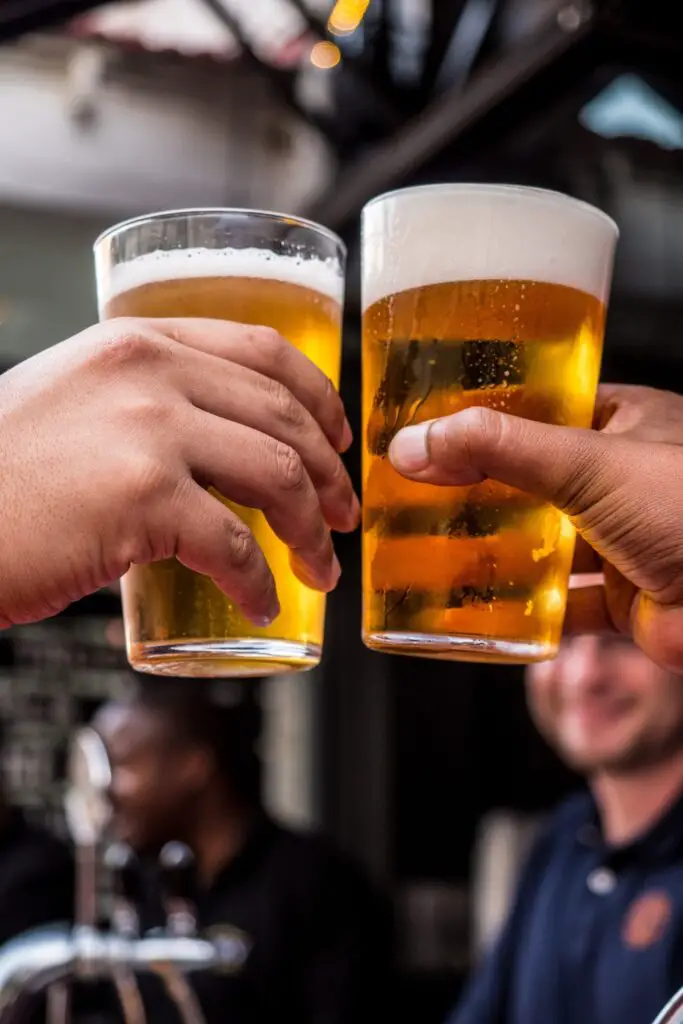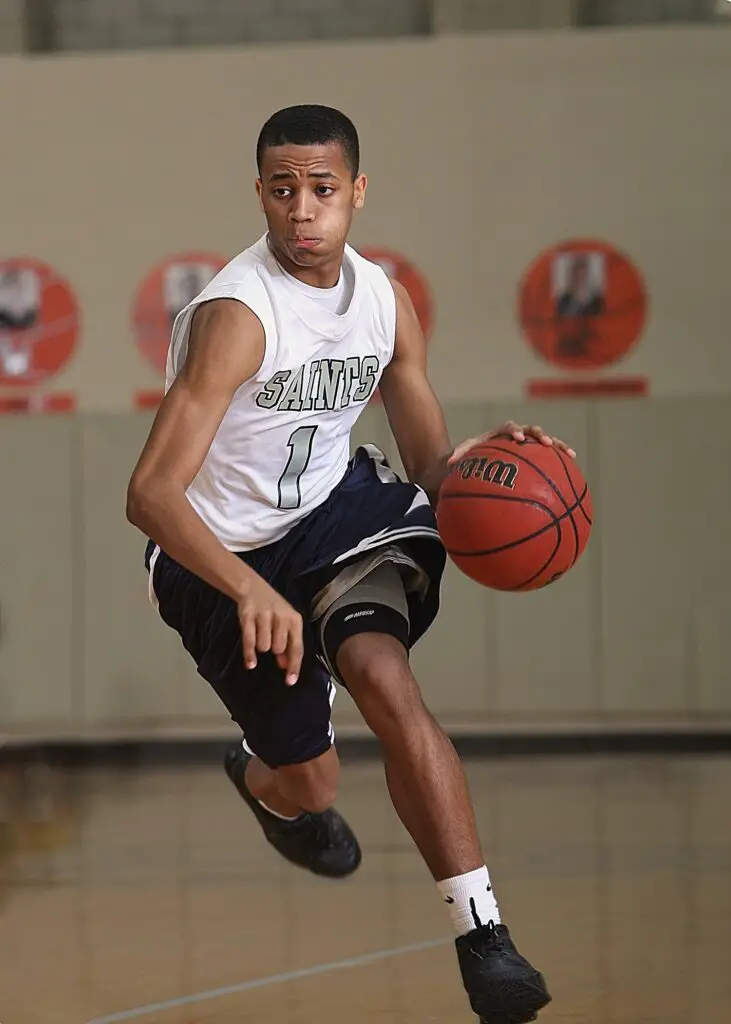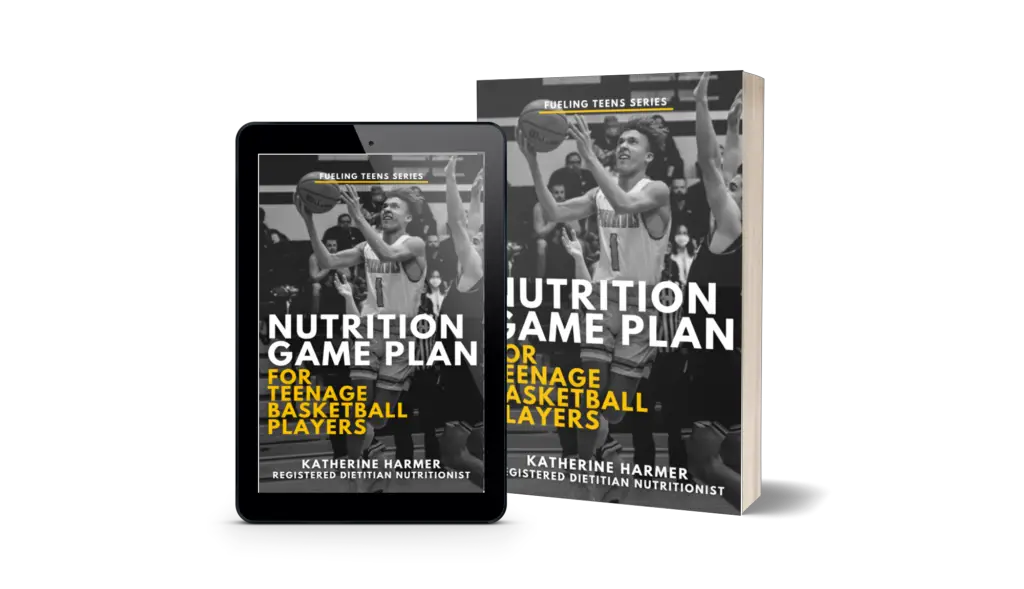It’s normal to want to know everything about the top players and do the things they do and eat the things they eat. But what about alcohol? Athletes should be very careful about alcohol intake because they may jeopardize their athletic performance and overall health.
Basketball players tend to enjoy the thrill-seeking lifestyle and drinking alcohol tends to mimic that “high” response. Many basketball players choose to drink alcohol, often in very unsafe quantities. Unfortunately the NBA is known for partying and alcohol problems of it’s own.
Keep reading for more tips and information about alcohol intake for teen basketball athletes, hydration tips, and what happens when you do drink before or after basketball games.

Be sure to check out my newest basketball nutrition eBook or my FREE sample basketball meal plan.
Do Professional Basketball Athletes Drink Alcohol?
There are some professional basketball players that do NOT drink alcohol. Some have chosen so for health reasons, religious reasons, personal preference, and others because alcoholism has been an issue for them in the past (DUIs, rehab) and they have decided to come clean and stay sober.
Jabari Parker of the Sacramento Kings doesn’t drink alcohol and a few others who have become sober or changed their ways from receiving DUIs etc. There’s not a long, well-known list of NBA players that don’t drink alcohol, but that doesn’t mean there aren’t benefits from staying away from the drinks.
There are many other sports stars who abstain from drinking alcohol. Cristiano Ronaldo, the top soccer player, does not drink alcohol due to family history (his father passed away from alcoholism). Tom Brady – arguably the best quarterback of all time- does not drink alcohol. He takes care of himself inside and out, like a machine, and doesn’t want alcohol to affect his playing ability on the field.
As an elite athlete, professional basketball players should take their job very seriously and treat their bodies carefully and abstain from alcohol. In the very least they should be very smart about their alcohol intake and drink very little. Some players hit the bars every Friday and party for most of the weekend and turn into alcoholics and have rough lives because of it. Others choose to drink occasionally in moderation and sometimes not at all.
NBA teams have rules regarding alcohol intake, where players can and can’t drink, curfews for partying, etc. It’s for their best interest as well as the whole team. Many, many players have had struggles with alcoholism and other addictions that have ruined basketball careers.
What does your team teach you? Follow the limits that your coaches and competitions give you, it’s for your own health and safety and helps you play at your best ability.
See also: How to Gain Weight and Muscle – for Teen Basketball Players
Why Alcohol is Bad For High School Athletes
Here’s a list of some of the reasons and health risks for why basketball players, especially teenage basketball players, should not drink alcohol:
- #1 reason – you’re underage and you should not consume alcohol illegally. Underage drinking is a really bad idea
- Increased blood pressure – Alcohol constricts blood vessels which means less blood flow is going to muscles. That means less energy and less oxygen is being delivered to your muscles. This is especially bad if you consumed alcohol before basketball
- Elevated triglycerides – Triglycerides are a type of fat in your blood that is stored in fat cells. You don’t want this level to be too high as it could lead to worse health problems
- Liver damage – Alcohol-related liver disease is preventable by not drinking. It causes inflammation, fat build-up, scarring, and reduced liver function
- Increased risk of cancer – Alcohol use increases your risk of a lot of diseases, including certain cancers
- Extra calories and weight gain – Alcohol provides extra calories which could lead to weight gain and other health conditions
- Poor performance – Your athletic performance will be negatively impacted. Your endurance, speed, agility, balance, and coordination will be reduced and your body’s ability to recover and build stronger muscles will decrease
- Diuretic effects – Alcohol can be a diuretic, so drinking too much makes you dehydrated and makes you pee more
- Compromises the immune system – Alcohol decreases your immune system response, which you need to stay healthy and to recover after a game
- Ruins lives – In large amounts, alcohol ruins performance, health, careers, relationships, and lives.
The effect of alcohol depends on many factors, including the timing of alcohol consumption, recovery time, injury status, and dose being consumed. Athletes should abstain from alcohol to avoid the negative impact on recovery and athletic performance.
These include some of the more severe risks of regularly drinking because athletes tend to over-indulge on alcohol often and can become alcoholics, with severe consequences. Athletes tend to consume greater amounts of alcohol through bingeing behavior compared with the general population, and put themselves at greater risk of alcohol-related problems.

What Happens if You Drink Alcohol Before a Basketball Game?
Timing of alcohol intake matters. It is not a good idea to drink alcohol before you are physically active. Do not drink alcohol the day of a basketball game, or the night before. Even if you drink the night before a big basketball game, your performance will be negatively impacted.
During a basketball game you need your body to be healthy, focused, energetic, and be able to perform at your top ability. If you recently consumed alcohol, it causes difficulties for you to be at your best. Your performance will suffer because your body will have a hard time processing stored fuel for your muscles, your energy will be lower, your playing capabilities and focus will be off, and you will increase your risk for injury.
Here’s details about side effects of drinking before a basketball game:
1. Your Body Cannot Effectively Process Stored Fuel For Your Muscles
Your body has a hard time processing alcohol and turning it into energy. Your liver has to focus on processing alcohol, which means it will be less efficient at producing glucose for energy for your muscles during a game.
2. Playing Capabilities Will Be Negatively Affected
There is a common belief that alcohol aids performance- this is not likely, there is a decrease in your endurance even if small amounts of alcohol are consumed before a game.
Alcohol impairs strength, power, muscular endurance, reaction time, memory, concentration, and dexterity during playing. With decreased coordination and delayed reactions you certainly won’t be playing at your best. It’s an easy choice to avoid alcohol.
3. Increases Your Risk for Injury
With compromised motor skills, impaired balance, and poor judgment, your performance is highly affected and your risk for injury is increased. If you are injured, alcohol will negatively impact your body’s healing process as well. Alcohol also decreases your immune function, resulting in prolonged healing time.
See also: What Do Basketball Players Eat Before a Game? -From a Dietitian
What Happens if You Drink Alcohol After a Basketball Game?
Alcohol negatively affects playing capabilities, so most athletes do not drink before a basketball game. Drinking in celebration or defeat after a game is much more common and a common occasion for athletes to drink, but still has negative effects on an athlete’s body.
Drinking alcohol is seen as a reward for the hard work put in during the game or for relaxation, so the majority of problematic alcohol-use occurs in the hours after a game. Alcohol consumption after a game won’t affect performance, but it interferes with the recovery process.
Here’s some common problems of consuming alcohol after a basketball game:
1. Nutritional Deficiencies
Post-game is a common time for athletes to consume alcohol, however this is the crucial time to implement correct nutritional strategies to recover, refuel, and rehydrate. You need to refuel with carbohydrates, protein, electrolytes, and plenty of water. You should never re-hydrate with alcohol. Alcohol does not contain enough carbs or electrolytes for proper recovery, but it still provides calories.
Alcohol also inhibits your body’s absorption of nutrients from food, which can lead to nutritional deficiencies with serious health and performance implications.
Avoid alcohol and do your best to follow nutrition guidelines in the hours after a game, your body needs it.
2. Less Protein Synthesis
After physical activity, your body repairs and rebuilds muscle tissue to make it stronger and bigger. With alcohol in your blood, there is less protein synthesis, so recovery is negatively impacted. Alcohol reduces production of testosterone and inhibits recovery and muscle adaptation to exercise. Your muscles won’t be built bigger and your endurance won’t increase as much with alcohol.
3. Poor Sleep
Athletes need adequate sleep! Alcohol intake negatively affects your sleep, especially if you have a hangover. It disrupts your sleep cycles and overall quality of sleep. Sleep is so important after a sporting event- it is needed to help your body recover and decrease your risk of injuries. You need more sleep after a basketball game than normal. Getting enough rest is essential for proper recovery to build and grow your muscle tissue.
Skip the alcohol after a game and get a good night’s sleep to rest, recover, avoid injuries, and rebuild stronger muscle tissue.
4. Bingeing
It is common among athletes to celebrate or reward themselves after a game by binge drinking and consuming large amounts of alcoholic beverages. Bingeing behavior is harmful and associated with long-term physical, psychological and social problems.
Athletes binge-drink more than others. Celebrating with alcohol is seen as the norm, and you may feel pressured to drink. It can seem cool to celebrate with a drink every once in a while, but learn to say no and skip it. Better yet, come up with an alternative way for your team to celebrate (or mourn) after a game. Tell your team you have a no-alcohol rule and find other ways to party such as going to the movies, hot tubbing, enjoying a team meal, or playing video games.
It may seem easy to control yourself and only have 1 or 2 drinks, but it’s not. Dietitians always ask patients about alcohol intake during nutrition assessments. I feel like a majority of adults I speak with have a hard time of sticking to the 1-2 drink recommendation. It is extremely easy to become an alcoholic and it affects so many other aspects of your life and health.
See also: The Worst Foods to Eat Before Basketball
Alcohol Recommendations for High School Basketball Players
There is no safe amount of alcohol for teenage athletes. Only adults of LEGAL age may consume alcohol, and then only 1-2 drinks are recommended. Alcohol hinders athletic performance and recovery and intake should be avoided for athletes hoping to be at their top performance capabilities.
Alcohol is a drug and a poison and should be treated like one and avoided. Consuming even low doses of alcohol before or after athletic performance is discouraged due to the negative effects of alcohol on performance and recovery.
If you are of legal age and choose to drink alcohol, always be smart and responsible about your choices. Start with a nonalcoholic drink first- preferably water- especially if you are thirsty. Drink your alcoholic beverages slowly and don’t drink on an empty stomach. Choose to drink 1-3 glasses of water between alcoholic beverages and don’t over-do it. If you don’t drink alcohol, keep it that way, starting is never recommended.
The Bottom Line
- Drinking alcohol negatively affects athletic performance and recovery.
- Alcohol intake is not recommended for athletes, especially for teenagers. Drinking too much alcohol can affect you for days after and cause poor decisions and bad habits.
- Anyone can become an alcoholic, those who are safe from the effects are those who abstain from alcohol.
Check out my newest eBook for personalized nutrition information to help you reach your top potential this basketball season! Includes a 5-week meal plan, snack list, and tips for how much/when/what to eat, hydration, supplements, losing or gaining weight, and more.
See it here: Nutrition Game Plan for Teenage Basketball Players

Related Questions
Is it Okay for Athletes to Drink Alcohol? It’s not a good idea for anyone to drink alcohol because of the negative consequences including increased blood pressure, elevated triglycerides, liver damage, increased risk of cancer, extra calories and weight gain, poor performance and focus, diuretic effects, compromised immune system, and ruins lives. If you are of legal drinking age and choose to drink, drink only 1-2 drinks in a day.
What do NBA Players Drink During a Game? NBA players stay hydrated on the court with water and sometimes sports drinks (like Gatorade, Powerade, or other brands) or juice. Sports drinks with carbohydrates and electrolytes (that means don’t choose any that are sugar free) may be helpful for intense exercise lasting over 1 hour where you are sweating heavily, otherwise choose water.
Do Professional Athletes Ever Get Drunk? Professional athletes get drunk, maybe even more so than you would think. It is common to celebrate a win or mourn a loss with alcohol and athletes are more likely to binge than others. There’s actually quite a long list of professional athletes who have DUIs or have been to rehab due to alcoholism addiction problems.
Do NBA Players Drink Beer? Yes, many NBA players drink beer. There are strict team rules on when and where the professional athletes can drink alcohol. Apparently wine is the favorite alcoholic beverage among some of the top players including LeBron James, Steph Curry, Carmelo Anthony, and more.
Can Athletes Drink More Alcohol Without Getting Drunk? The only way to not get drunk is to drink in moderation or not drink at all. Athletes are not immune from being drunk, and binge more often than other individuals. They can get drunk just as quickly. There is no safe level of alcohol as anyone can become an alcoholic.
See Also
- How to Gain Weight – for Teen Basketball Players
- The Worst Foods to Eat Before Basketball
- What is the Best Diet Plan for a 15 Year-Old?
- Is Whey Protein Safe for Teenage Athletes? Here’s What Dietitians Recommend
- Best Supplements for Teenage Athletes
Written by Katherine Harmer, Registered Dietitian Nutritionist
Fueling Teens is a participant in the Amazon Services LLC Associates Program, an affiliate advertising program designed to provide a means for sites to earn advertising fees by advertising and linking to Amazon.com. We also participate in other affiliate programs which compensate us for referring traffic.
